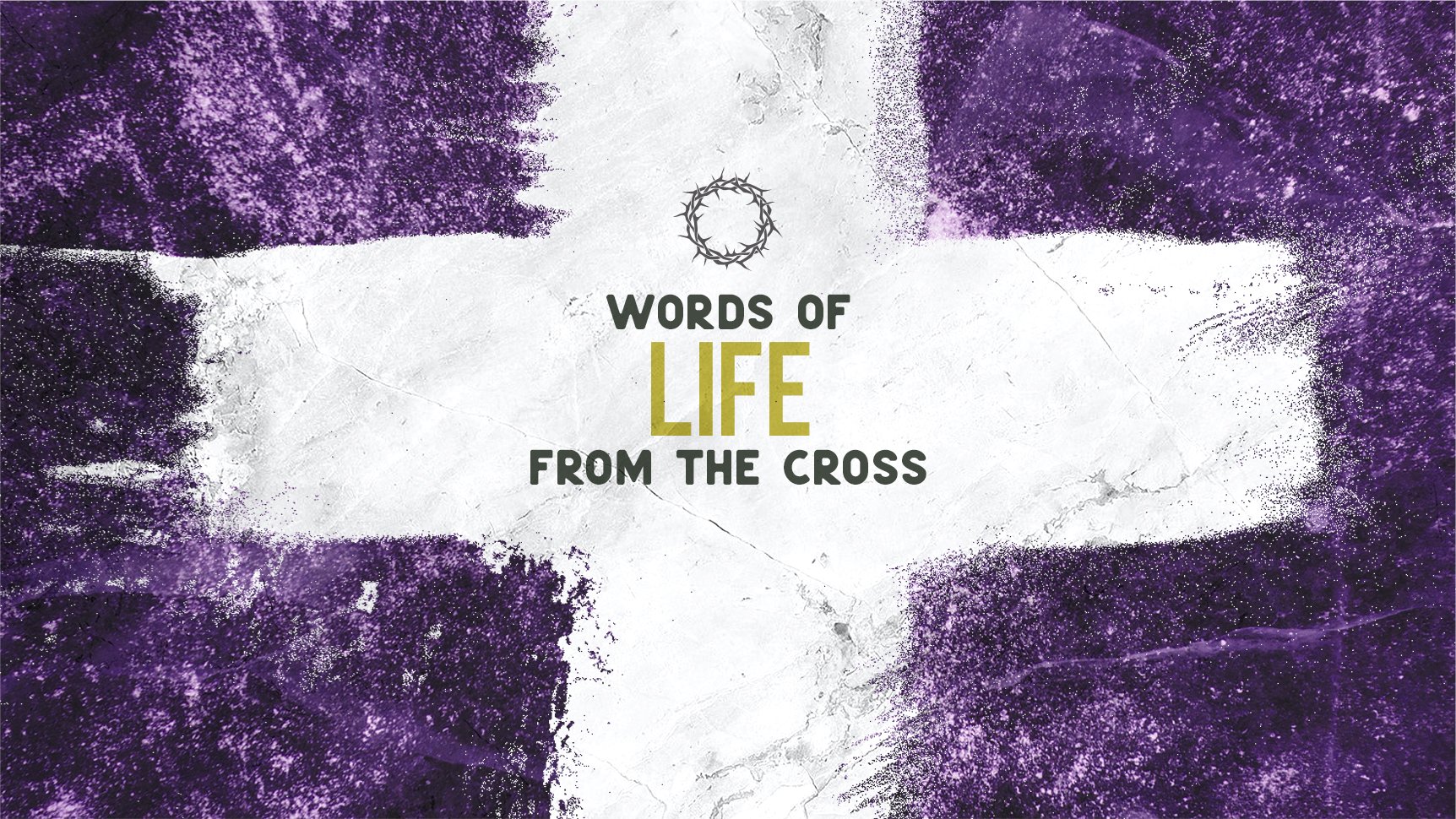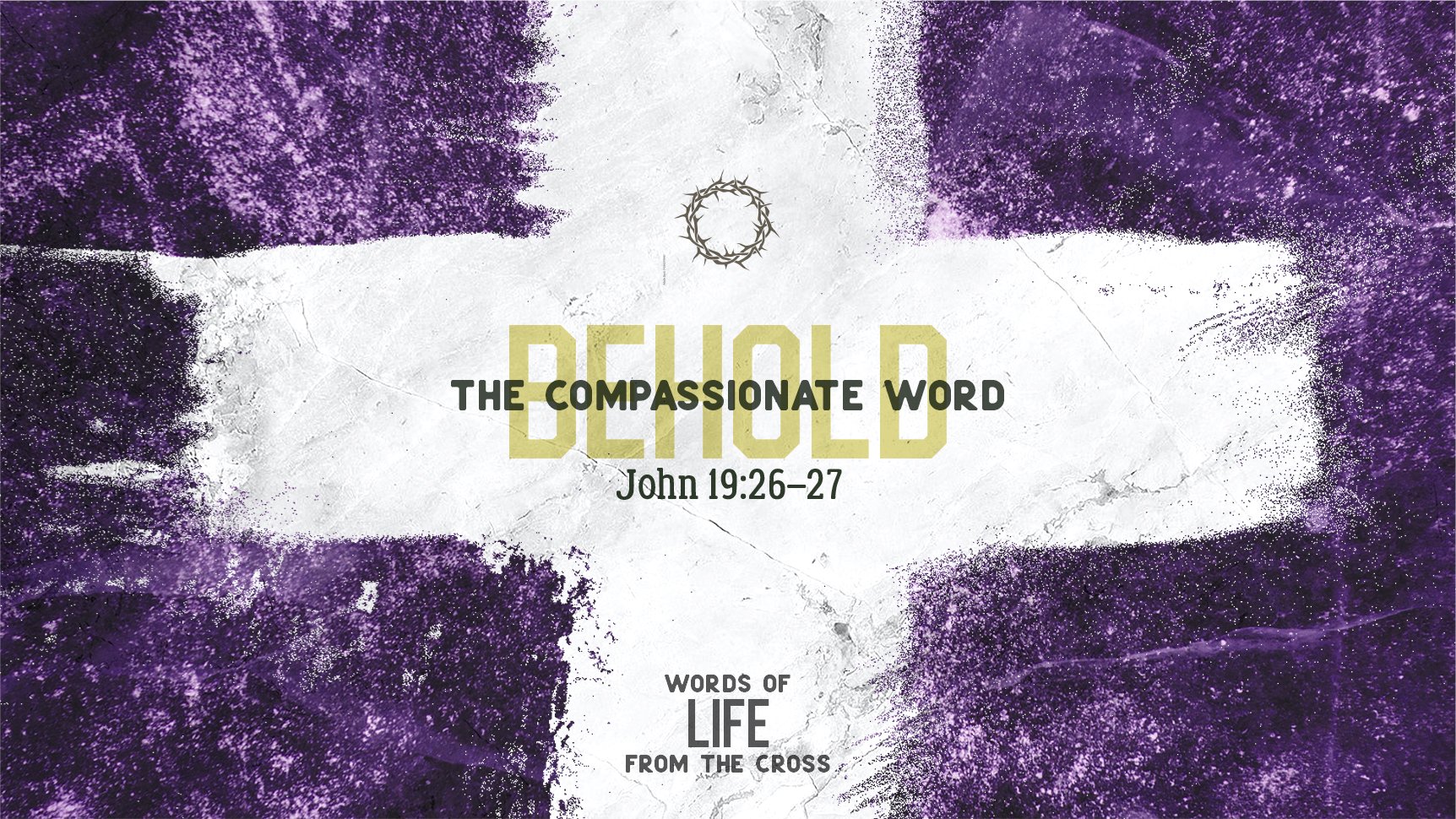The Compassionate Word | Third Sunday of Lent | John 19:23–27
“When Jesus saw His mother and the disciple whom He loved standing nearby, He said to His mother, “Woman, behold, your son!” Then He said to the disciple, “Behold, your mother!” And from that hour the disciple took her to his own home.”
March 20, 2022 | 10:45 a.m.
The Third Sunday of Lent
This week’s word from the cross is a word of compassion. “Woman, behold, your son! . . . Behold, your mother!” The disciples had fled in fear. Only the women remained, along with the disciple whom Jesus loved. Mary, His mother, her sister, Mary the wife of Clopas, and Mary Magdalene together with John. These remained near the cross, keeping vigil.
READINGS
Psalm 103:8-14
Isaiah 49:13-18
Acts 20:18b-24
John 19:23-27
message presented by Rev. Frank C. Ruffatto
+Points to ponder
- Is there a difference (by definition) between Mercy and Grace? Why might we need both? (Bonus question: where can you go and be sure that God’s mercy and grace will be there for you?)
- How does this account of Jesus, while on the cross, tending to the needs of His mother and friend, encourage you?
- Why is it that God formed His Church and why is it risky to neglect Her?
+Sermon Transcript
Grace, mercy, and peace be unto each of you from God our Father and our Lord and King, Jesus the Christ. Amen. Let us pray: Keep watch over Your church, O Lord, with Your unfailing love; and, since it is grounded in human weakness and cannot maintain itself without Your aid, protect it from all danger, and keep it in the way of salvation; through Jesus Christ our Lord, who lives and reigns with You and the Holy Spirit, one God, for ever and ever. Amen.
“A mother once approached Napoleon seeking a pardon for her son. The emperor replied that the young man had committed a certain offense twice and justice demanded death. ‘But I don't ask for justice,’ the mother explained. ‘I plead for mercy.’
‘But your son does not deserve mercy,’ Napoleon replied. ‘Sir,’ the woman cried, ‘it would not be mercy if he deserved it, and mercy is all I ask for.’ ‘Well, then,’ the emperor said, ‘I will have mercy.’ And he spared the woman's son.”
As the season of Lent continues, how can we not think on the mercy of God? Mercy … and compassion. The fourth word from the cross is a word of compassion. “Woman, behold, your son! ... Behold, your mother!” The disciples had fled in fear. Only the women remained, along with the disciple whom Jesus loved. Jesus’ mother, Mary, her sister, Mary the wife of Clopas, and Mary Magdalene together with John. These remained near the cross, keeping vigil.
No mother expects to see her child die. That is quite out of order. Children are supposed to bury their mothers, not mothers their children. Simeon had told Mary that a sword would pierce her own soul too. Did she realize at the time what those prophetic words meant? How it must have grieved the blessed mother of our Lord to see her Son dying on the cross! What mother could bear such a sight? Could she have imagined such things that glorious night in Bethlehem when shepherds came to visit and told of angels and heavenly “Glorias” as she had pondered everything they said in her heart? Could she have known the destiny of her Son as He changed water into wine at the wedding at Cana? Could she have understood why this was necessary to save the world, to save her?
John, His best friend, is there too. Who can bear to watch his best friend die such a horrible death? John, who had leaned on Jesus the night before at table, now stares up at the scene against the blackened sky. It was all so confusing. It was not the way it was supposed to go. They had ridden into Jerusalem to shouts of “Hosanna!” and the waving of palms. Jesus had entered the city like the King that He was. It was His moment; the crowds were with Him. And now it all comes down to this. Here Jesus is broken, beaten, bleeding, dying. John’s heart, too, must have been broken as this Son of Thunder stands there utterly helpless to help his best friend.
From the cross, Jesus looks with compassion on His friend whom He loved and upon His mother, the gentle woman who had bore Him, nursed, and nurtured Him, raised Him from boyhood in Nazareth. Some hold the belief that Joseph had long since died. Jesus had cared for His mother as her firstborn son. Now, in a singular intimate moment, He entrusts His beloved mother to His beloved disciple, to John. “Woman,” He says, addressing her with honor and respect, as He always did. He never calls her “Mother” in Scripture, though she was His mother. Instead, He calls her “Woman,” emphasizing that she has no special status as His mother yet she is accorded full respect and honor. “Woman, behold, your son. Behold, your mother.” As Jesus is the surrogate Sinner, so now John is the surrogate son. Such compassion Jesus has that even in His dying breath, He cares for the needs of His mother. From that time on, John took her into his home. Behold, thy mother.
He places us into family, into community. He gives us to one another that we may be sons and daughters, mothers, and fathers, for one another. One time, when Mary and Jesus’ family wanted to take Him into protective custody, fearing that He had lost His mind, His disciples told Him, “Your mother and brothers are here for you.” Jesus looked at the people gathered in a circle around Him and said, “Whoever does the will of My Father in heaven is my brother and sister and mother.” “To do the Father’s will includes believing. By doing what pleases the Father, we identify ourselves as members of the family of Jesus. ;
Death is a thief robbing us of the company of those we love, separating mothers from sons, fathers from daughters, and husbands from wives. This is the isolating result of our sin that we are separated from those we love by death. Sometimes sin has a wedging way, driving deep divisions into families, setting members against one another, estranging us from one another. Divorce is the tip of the iceberg that cuts through the bonds of blood. But Jesus calls us into community, into His family, the Church. We are children of God, born in Baptism, born of our holy virgin mother, the Church. Woman, behold, thy son, thy daughter. Child of God, behold, thy mother. As John stayed near the mother of Jesus, we are encouraged by the author of Hebrews to embrace this personal and intimate gift from our Lord: “And let us consider how to stir up one another to love and good works, not neglecting to meet together, as is the habit of some, but encouraging one another, and all the more as you see the Day drawing near.”
“God requires Christians to gather to hear His Word preached, receive the Sacraments, pray, sing, and give thanks. Those who [neglect our Mother,] the Church, [can] easily fall from the faith.”
And so, “the separation in His death is the death of our separation.” The barrier of sin is torn down; the judgment of the Law lifted; the gates of our solitary confinement opened wide. The death of Jesus brings us together into Holy Communion and a holy community. Gathered in His Name, around His Word, Baptism, body and blood, we are bound together in His death and life.
“Some may remember the days when DC-7s were the fastest planes flying across the country. Their engines could annoy the eardrums as they also vibrated the cabin. On a night flight out of Los Angeles one passenger was finding it difficult to get to sleep and made a derogatory remark about the noisy engines. His companion, almost asleep, slowly drawled, “Let’s not complain unless we do not hear the noise at all.” So, it is with the organized church. We may wonder at the necessity of the hum and noise of activity, of programs and meetings to keep the church in operation. Yet if this hum ceased, what then?”
It is said that blood runs thicker than water. Family ties are strong. But baptismal water runs even thicker than blood, for it binds us together as one in the Body of Christ, a communion that goes on forever. The bonds of blood end with death. Husband and wife are united as “one flesh” until death parts them. But our unity in the body of Christ goes beyond death and the grave and on to resurrection and eternal life. Look around you and behold your brother, your sister, your family. He gives us to one another.
Years later, John reflected on this in his First Epistle: “Beloved, let us love one another, for love is from God, and whoever loves has been born of God and knows God. Anyone who does not love does not know God, because God is love. In this the love of God was made manifest among us, that God sent His only Son into the world, so that we might live through Him. In this is love, not that we have loved God but that He loved us and sent His Son to be the propitiation for our sins. Beloved, if God so loved us, we also ought to love one another. No one has ever seen God; if we love one another, God abides in us, and His love is perfected in us.”
I think that the hymn, “Jesus, in Your Dying Woes” rounds this out nicely:
‘Jesus, loving to the end Her whose heart Your sorrows rend, And Your dearest human friend: Hear us, holy Jesus.
May we all Your loved ones be, All one holy family, Loving, since Your love we see: Hear us, holy Jesus.’ Amen.
“May the God of hope fill you with all joy and peace in believing, so that by the power of the Holy Spirit you may abound in hope.”
ABOUT THE SERIES
This series features words of Christ He spoke from the cross as He offered up His life for the life of the world. Each word imparts a blessing and is a word of Gospel. The sermons and devotions in this series will expound on these words of Christ, linking them to Jesus’ words and works recorded in the Gospel as well as the Old Testament prophesies that pointed to Him. Each word of Christ proclaims and delivers something about Him, the Word Incarnate, and delivers His saving death to us that we would trust Him for forgiveness, life, and salvation.










